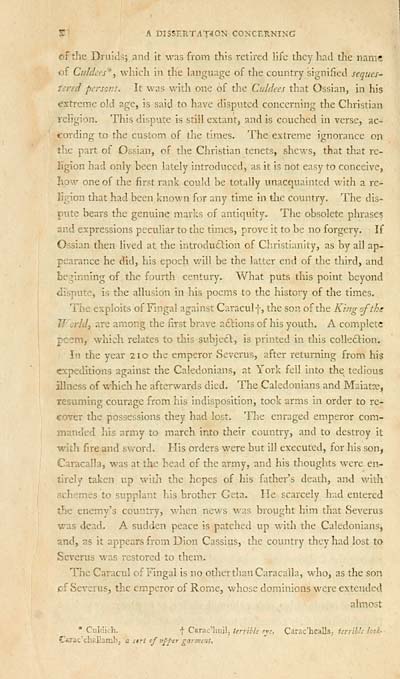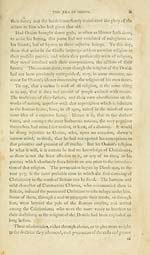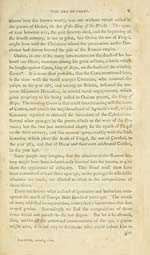Download files
Complete book:
Individual page:
Thumbnail gallery: Grid view | List view

S; A DISSERTATION CONCERNING
of the Druldsj and it was from this retired life they had the nanii
of Culdees*y which \n the language of the country signified seques-
tered persons. It was with one of the Culdees that Ossian, in his
extreme old age, is said to have disputed concerning the Christian
religion. This dispute is still extant, and is couched in verse, ac-
cording to the custom of the times. The extreme ignorance on
the part of Ossian, of the Christian tenets, shews, that that re-
ligion had only been lately introduced, as it is not easy to conceive,
how one of the first rank could be totally unacquainted with a re-
ligion that had been known for any time in tlie country. The dis-
pute bears the genuine marks of antiquity. The obsolete phrases
and expressions peculiar to the times, prove it to be no forgery. If
Ossian then lived at the introdudlion of Christianity, as by all ap-
pearance he did, his epoch will be the latter end of the third, and
beginning of the fourth century. What puts this point beyond
dispute, is the allusion in his poems to the history of the times.
The exploits of Fmgal against Caracul f, the son of the Kifjg of the
Ifcr/d, are among the first brave aftions of his youth. A complete
pcem, which relates to this subjeft, is printed in this collection.
In the year 210 the emperor Severus, after returning from his
expeditions against the Caledonians, at York fell into thq tedious
illness of which he afterwards died. The Caledonians and MaiatK,
resuming courage from his indisposition, took arms in order to re-
cover the possessions they had lost. The enraged emperor com-
manded liis army to march into tlieir country, and to destroy it
with fire and sword. His orders were but ill executed, for his son,
Caracalla, was at the head of the army, and his thoughts were en-
tirely taken up with the hopes of his father's death, and with
schemes to supplant his brother Geta. He scarcely had entered
the enem.y's country, when news was brought him that Severus
was dead. A sudden peace is patched up with the Caledonians,
and, as it appears from Dion Cassius, the country they had lost to
Severus was restored to them.
The Caracul of Fingal is no other than Caracalla, who, as the son
pf Severus, the emperor of Rome, whose dominions were extended
almost
* Culdidi. f Carac'luijl, ifrriHe fvc, Carac'healla., f^niUc lah
Cwat'challamh, a sari of u^per garment.
of the Druldsj and it was from this retired life they had the nanii
of Culdees*y which \n the language of the country signified seques-
tered persons. It was with one of the Culdees that Ossian, in his
extreme old age, is said to have disputed concerning the Christian
religion. This dispute is still extant, and is couched in verse, ac-
cording to the custom of the times. The extreme ignorance on
the part of Ossian, of the Christian tenets, shews, that that re-
ligion had only been lately introduced, as it is not easy to conceive,
how one of the first rank could be totally unacquainted with a re-
ligion that had been known for any time in tlie country. The dis-
pute bears the genuine marks of antiquity. The obsolete phrases
and expressions peculiar to the times, prove it to be no forgery. If
Ossian then lived at the introdudlion of Christianity, as by all ap-
pearance he did, his epoch will be the latter end of the third, and
beginning of the fourth century. What puts this point beyond
dispute, is the allusion in his poems to the history of the times.
The exploits of Fmgal against Caracul f, the son of the Kifjg of the
Ifcr/d, are among the first brave aftions of his youth. A complete
pcem, which relates to this subjeft, is printed in this collection.
In the year 210 the emperor Severus, after returning from his
expeditions against the Caledonians, at York fell into thq tedious
illness of which he afterwards died. The Caledonians and MaiatK,
resuming courage from his indisposition, took arms in order to re-
cover the possessions they had lost. The enraged emperor com-
manded liis army to march into tlieir country, and to destroy it
with fire and sword. His orders were but ill executed, for his son,
Caracalla, was at the head of the army, and his thoughts were en-
tirely taken up with the hopes of his father's death, and with
schemes to supplant his brother Geta. He scarcely had entered
the enem.y's country, when news was brought him that Severus
was dead. A sudden peace is patched up with the Caledonians,
and, as it appears from Dion Cassius, the country they had lost to
Severus was restored to them.
The Caracul of Fingal is no other than Caracalla, who, as the son
pf Severus, the emperor of Rome, whose dominions were extended
almost
* Culdidi. f Carac'luijl, ifrriHe fvc, Carac'healla., f^niUc lah
Cwat'challamh, a sari of u^per garment.
Set display mode to: Large image | Transcription
Images and transcriptions on this page, including medium image downloads, may be used under the Creative Commons Attribution 4.0 International Licence unless otherwise stated. ![]()
| Early Gaelic Book Collections > Ossian Collection > Poems of Ossian, the son of Fingal > (22) |
|---|
| Permanent URL | https://digital.nls.uk/77922576 |
|---|
| Description | Selected books from the Ossian Collection of 327 volumes, originally assembled by J. Norman Methven of Perth. Different editions and translations of James MacPherson's epic poem 'Ossian', some with a map of the 'Kingdom of Connor'. Also secondary material relating to Ossianic poetry and the Ossian controversy. |
|---|
| Description | Selected items from five 'Special and Named Printed Collections'. Includes books in Gaelic and other Celtic languages, works about the Gaels, their languages, literature, culture and history. |
|---|

